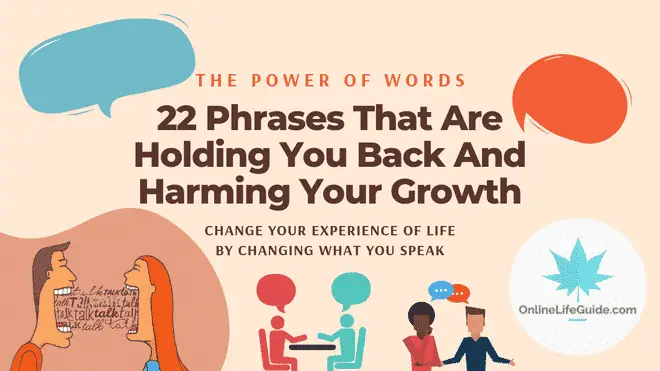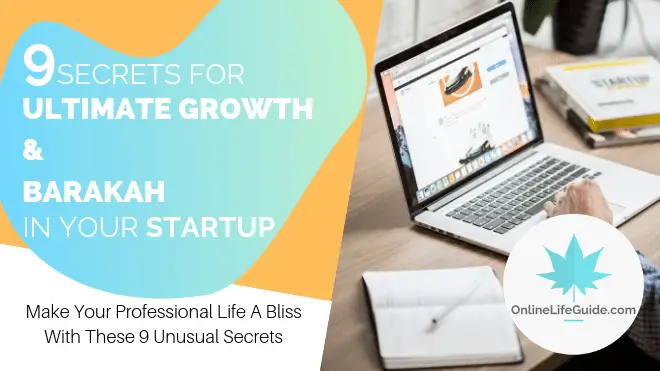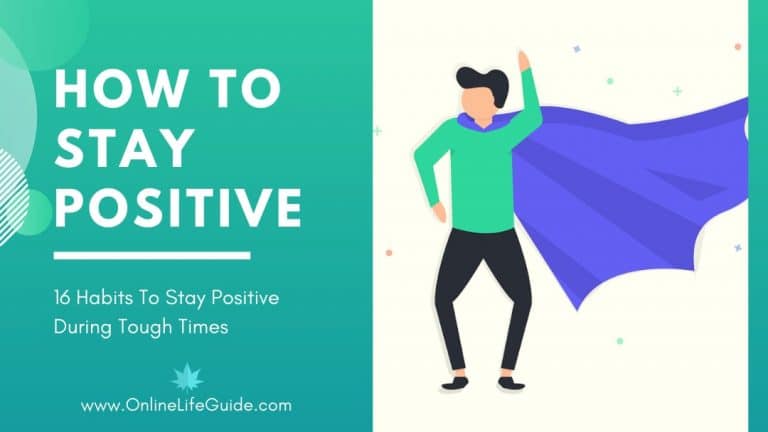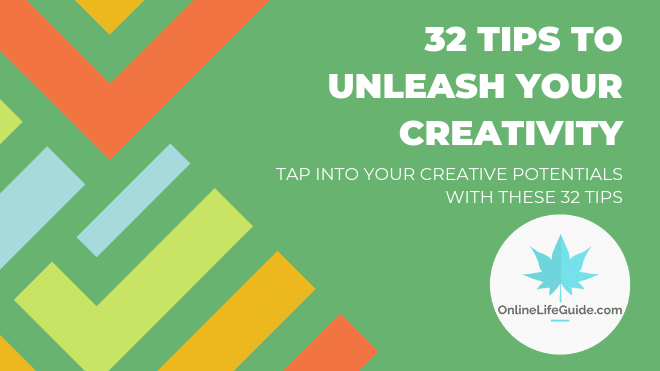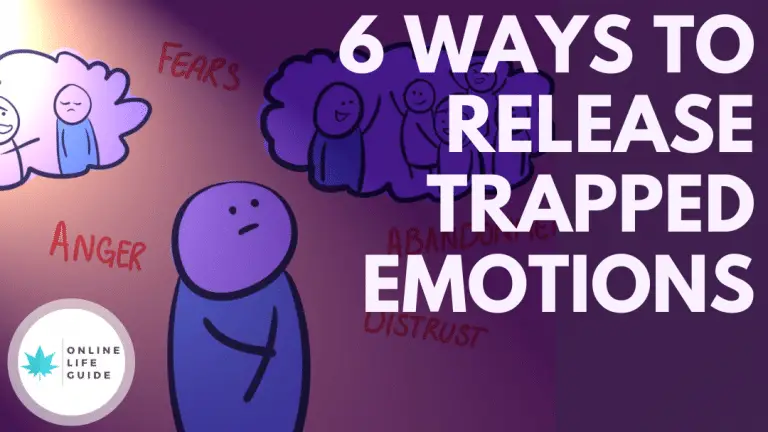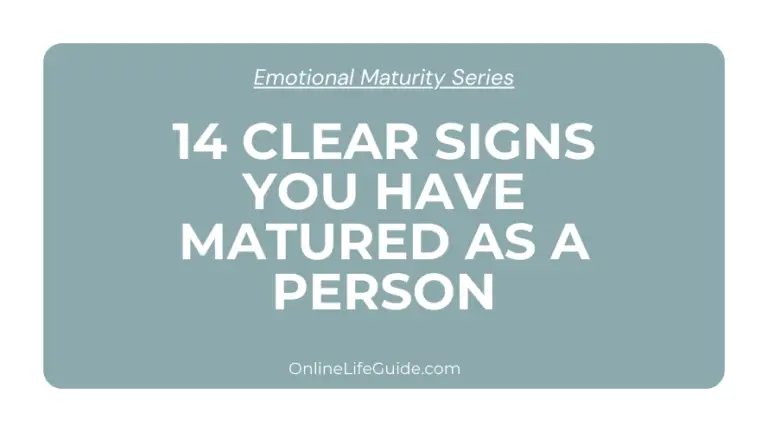10 Practical Steps To Let Go Of Your Past And Move On
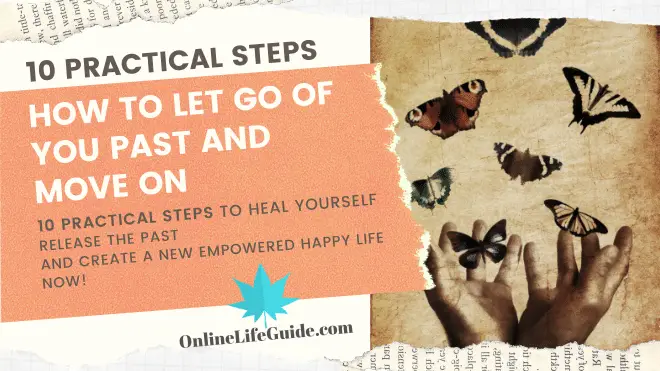
Let’s face it, life is not always sunshine and rainbows. Many of us had our shares of challenging experiences and sometimes those past experiences and memories seem to stick on to us long after, making it harder to let go of the past and move on.
Even though it might be over, the past experiences and memories continue to occupy our mind and affect the quality of our life. It becomes difficult to enjoy the present moment if we are constantly thinking of the past.
This affects our day to day performance and drains our mental energy. We tend to lose interest in our everyday life.
This might seem like a stuck state making you wonder how to REALLY let go of the past and move on?
If any of this resonates with you and you are looking to make a shift in your life, you have come to the right place.
I have put together this guide based on not just my own life experiences but also the experiences I had with the people I have counseled and coached.
This is not the usual motivational mumbo-jumbo, but a clear, specific, and practical guide to enable you to make changes immediately!
There are certain common patterns that many of us fall into when dealing with the past which seem to keep us stuck. We’ll discuss the solutions in detail and by the end of this guide you’ll be equipped with new tools, ideas and resolutions to look forward to and change your life starting today!
1) Stop Taking The Escape Route
A very common pattern many of us fall into is to escape from the feelings linked to past memories/experiences.
Often times, in doing so, we try to get a quick and instant feeling of pleasure. A quick dopamine release (dopamine is a hormone responsible for the feeling of pleasure).
And in doing so, we indulge ourselves in certain activities or behaviors that apparently seem to serve as a quick fix magic pill but does more harm than good in the long term.
In the beginning, many of us are not even aware of what we are doing. We just do it on an unconscious level.
Such a quick fix soon becomes an addictive pattern which begins to have a negative impact on the overall quality of our lives.
Some Common Escape Routes
Here are some of the most common escape routes many people take:
Excessive Eating
Craving for sweets and sugary foods
Smoking
Relaxant pills
Tobacco
Excessive media consumption (including social media)
Music
Porn
Drugs
Attention seeking (unconsciously behaving in a certain way to gain attention or empathy)
Excessive Sleeping
Shopping (spending lots of money buying unnecessary things)
Excessive Gaming
Extended Isolation
“Time Killing” activities
Alcohol
Etc.
How Does Escaping Yourself Affect Your Mind?
What many of us really do when we take such escape routes is we try to distract our mind from engaging in certain thought processes.
As a result, those unfinished thought processes keep on hanging in the back of our minds, just like incomplete and open case-files that never really got to a conclusion.
Over time, if we keep dealing with our negative experience with such an approach, these unfinished files in the background keep piling up in our unconscious mind until we are overwhelmed and eventually snap.
That is a one-way ticket to neurosis.
To move on with our lives and have a healthy mental state, it is important that we allow the inner thought process to complete and that we consciously derive the lessons/wisdom that Allah wants us to learn from our past.
By escaping, we are only delaying the process infinitely and keeping ourselves away from harmony and peace.
It can be a bit uncomfortable to take responsibility to learn from our experiences, but that is the proper way to do it. Sometimes we just have to push ourselves out of our mental comfort.
At this point, some of you might be wondering,
“Are you suggesting to keep on thinking about the past? Wasn’t this guide about how to let go of the past and move on?”
Well, when we process our thoughts properly with patience and an optimistic approach, it leads us to find meaning and wisdom behind whatever happened in the past.
It then becomes easier to be at peace with ourselves and our past.
The doors to wisdom begin to open and things begin to make sense. It all adds on to our wisdom, intellect, and spirituality. It’s a new and stronger version of you in the making.
And it can only happen when you allow this natural process of learning to come to completion.
A natural question now would be “How to process our thoughts of the Past?”
Read on.
How To Process Thoughts Of The Past In A Healthy Way?
It’s unhealthy to indulge too much in painful/tough memories. On the other hand, it’s also unhealthy to be completely ignorant of the lessons God wants you to learn.
Many people take a victimized approach towards their tough experiences. This only increases their pain and keeps them stuck.
The healthy way to approach your past is through a Curious attitude. When you are curious, you detach yourself emotionally from the context and focus on what is there to learn.
Once you take the life-lessons from it and come into harmony with the wisdom of why that experience happened in your life, you basically complete the internal learning process and become fully ready to move on.
You can learn in-depth about how to develop a curious attitude in this guide:
Why is Curiosity Important?
In order to allow yourself to process the thoughts of the past in a healthy and productive manner, you must take some time out for yourself.
Spend some quality, healing time with yourself. We’ll discuss more of that next.
2) Start Taking Care Of Yourself And Heal Fully
This is one thing many people miss out on. While being too busy with our personal and professional lives, we forget to invest some quality time with ourselves.
The escape routes that we discussed above, distract us further away from connecting with our own self.
Even when you’re not dealing with past memories, it is still necessary to get some headspace and allow ourselves to recalibrate to our natural function (Fitrah).
Many of us unconsciously feel that we are “supposed” to be sad because we have had such negative/painful experiences. It feels a bit weird to be happy and spend some
So a lot of people choose to just sit there in a miserable state and expecting life to change automatically for them.
This sad and miserable state kind of becomes a comfort zone since there is nothing to do except to wait for our feelings to automatically get better.
Some unconsciously also think that if they come back to their natural, healthy, and happy state, other people might perceive them as insensitive and not take them seriously, or people will lose empathy for them.
And so, many of us unknowingly keep ourselves in a sad state due to societal or ethical pressures.
You can break out of this state and take charge for your happiness and joy simply by connecting with your own self.
Be kind and generous with yourself. Give yourself love and respect. Explore your hobbies and interests.
Remember, You are free to take care of yourself and love yourself no matter what!
By taking good care of yourself, you are not only doing yourself a service but also doing other a service as well because you’ll be able to contribute towards others more when you yourself are in a healthy state mentally, spiritually, and physically.
HOW TO HEAL YOURSELF?
Here’s a rule of thumb to keep in mind, anything that helps you get back to your natural state of being, mentally, physically or spiritually, will Heal you.
In fact, the process of healing is basically the process of getting back to our natural state.
When you get a cut on your finger, your body starts the healing process to get the skin and flesh back to its natural place. If you allow it to heal by protecting it and taking good care of it, it will heal naturally and you’ll soon be in a healthy state again.
Same is true for our mental and spiritual health.
If you take good care of your Soul, Mind, and Body while avoiding any behavior, activity or thought pattern that can potentially slow down the healing process, you’ll recover faster than you think, In-
Here are some healing activities/habits categorized by Physical, Mental and Spiritual aspects of our existence:
Physical Healing
- Regular Exercise (Walking, jogging, yoga, weight-lifting, etc.)
- A Natural, healthy diet, based more on vegetables and fruits while having less fat and sugar. Foods and ingredients that will nourish and detoxify your body.
- Early sleeping routine. Set and rise with the sun. (ideal timing for quality, anabolic sleep proven by research is between 9 pm – 5 am, which is also the sunnah timing for sleeping i.e. sleep after Isha prayer and wake up before Fajr)
- Dress up neatly and properly every day. How we dress can have a lot of impact on how we feel. So wear clean and ironed clothes, and take care of your hygiene.
Mental Healing
- Read good books on personal development and growth.
- Be around positive/uplifting people and inspiring environments.
- Spend some uninterrupted time in nature, regularly.
- Make it a habit to take a couple of days off from digital devices and internet every now and then.
- Take out some time to RELAX daily. Download my Guided Relaxation Therapy for FREE.
Spiritual Healing
- Connect with God through prayers and supplications (the 5 daily prayers).
- Do selfless acts of kindness (it’s ideal that you do it anonymously).
- Get connected with the Quran. Read the
Quran with understanding and reflection.
“And We send down of the Quran that which is Healing and Mercy for the believers”
– Quran [17:82]
- Contribute towards society/people from your blessings (money, skills, knowledge)
“You will not achieve righteousness until you donate some of what you love/cherish. And whatever you give is certainly well known to God.”
– Quran [3:92]
- Protecting yourself from useless, time-wasting activities. Such activities desensitize the soul and take away the sense of spiritual richness and wholeness from the person.
3) Stop Talking About Your Past
Another pattern that is very common is that many of us talk much about our problems and our past.
Interestingly, whatever we focus on, expands! And whatever we focus on, becomes our experience.
So the more we talk about it, the more we are diverting our focus and energy towards it. If we keep doing that, those feelings will only expand and increase, or at the very least, stick on to us until we really decide to let go.
The reality is, if you’re still talking about it, it shows that you haven’t yet let go of your past fully and those thoughts might still be your center of focus.
Focus On Better Things
Find empowering things to focus on. Observe what you usually converse about and direct your thoughts and your conversations towards uplifting and interesting topics.
Introduce new things into your life. New hobbies, new interests. Go out of your way to try things you haven’t experienced before.
Find people of similar hobbies and interests with whom you can have creative conversations.
Note that sometimes the people we surround ourselves keep bringing up our past whenever we converse with them. They might be doing it out of empathy and concern but that does more harm than good. It is better to communicate with them clearly that you don’t want to talk about that topic anymore. Let’s talk about something else.
4) Eliminate Disempowering Beliefs About The Past
One of the biggest hurdles in any area of life is our own limiting beliefs. We often remain stuck just because of our own belief system.
We might have adopted such beliefs from our close ones or the culture and society or maybe they are assumptions based on our previous experiences. We tend to consider them as the absolute truth and close ourselves off from a lot of other possibilities.
Here are some common limiting-beliefs people have related to their Past:
“Life is unfair.”
“It was so bad that it’s not possible for me to heal.”
“I’m broken into pieces.”
“The mark it left on my life will remain forever.”
“I’m scarred for life.”
“Once it’s done, it’s hard to go back to normal.”
“I know what I’m going through, no ones can realize my pain. If you were in my place then only you would know how hard it is to let go.”
“If I let go, I’m somehow approving others’ bad behavior.”
“I need an apology.”
“It
“It is someone else’s responsibility to make this better for me.”
These are just to list a few. Be honest with yourself and identify your limiting beliefs.
5) Develop Empowering Beliefs
Our experience of life largely depends upon our belief systems, so let’s replace any limiting beliefs we might have had with positive and empowering ones.
- “Everything happens for a reason. There’s a purpose behind everything.”
“Those who remember Allah standing, sitting, and lying down on their sides, and think deeply about the creation of the heavens and the earth, (saying): “Our Lord! You have not created (all) this without purpose, glory to You!”
– Quran [3:191]
- God wants me to learn something from this.
- Challenges and tough times make us grow exponentially.
- Through these challenging times, God might be training and preparing me for something higher and better.
- Smooth seas don’t make skilled sailors.
- God does not burden anyone beyond their capacity, which means any challenges/hardships I’m facing are in my capacity to handle and overcome.
“God does not burden any soul with more than it can bear”
– Quran [2:286]
- Something better is coming up ahead for me.
“If Allah knows any goodness in your hearts, He will give you something better than what has been taken from you and will forgive you. Allah is Most-Forgiving, Very-Merciful.”
– Quran [8:70]
- There is nothing to regret and no one to blame. Blame and regret bring no good to the world.
- The best way for me to fix things now is to learn my lesson, never repeat previous mistakes, and make myself and my life better from now on.
“Every son of Adam makes mistakes, and the best of those who make mistakes, are those who repent (and reform).”
– Muhammad (Peace be upon him) [Tirmidhi]
- There is always a good side to bad experiences. I just have to have faith and shift my perception.
“Perhaps you hate a thing and it is good for you, and perhaps you love a thing and it is bad for you. And Allah Knows, while you know not.”
–Quran [2:216]
6) Learn The Art Of Cherishing Your Present
“Cherish your present”
“Live in the moment”
“Past is no more, it’s gone, what you have is today”.
These are some commonly used but much-underrated statements.
If you want to let go of the past, it is crucial that you begin to live in the present and fully cherish it.
Living in the present does not happen just by merely saying it. A lot of people preach it, but never really tell you how to do it. How to really start living and loving what you have right NOW?
It takes certain practices to train your mind to live in the present. It’s a process and it takes consistency.
Take an example of our physical state.
If someone is a bit over-weight and wants to transform his body, he has to go through the process of training his body until he gets his desired results. Going to the gym for a day or two won’t do him much benefit in the long run, would it?
Even when he does go through the process and achieves his desired result, he must continue with his exercise routine.
It would be hard for him to continue if he considers exercise as a chore or a burden. It’s very important that he approaches health and fitness with a positive attitude where he enjoys and looks forward to working out.
As he begins to love his workout routine, making it a lifestyle will become natural and effortless for him.
Similarly to live in the present and fully cherish it, you must follow certain practices regularly and that will train your mind to live in the present moment naturally and effortlessly.
We have discussed quite a few things in this guide and since I don’t want to make it longer, I have written a separate guide focused entirely on developing Mindfulness in which we’ll look 11 practices to Live in the Present moment.:
MINDFULNESS GUIDE – 11 PRACTICES TO BE MINDFUL AND LIVE IN THE MOMENT
You must check this guide out as this is a very important step in moving on from your past. When you do, rather than considering those practices as some quick-fix techniques, make it a part of your lifestyle and you’ll see transforming resulting God-willing.
7) Have Something To Look Forward To
If you don’t envision forward, you’re probably going to move backward.
I personally believe that there is no such thing as a “stagnant” state. We are either growing forward or rotting and rusting. We are either progressing or regressing.
Sometimes “things” or “circumstances” might apparently seem to be stagnant or stuck in one place, but what we choose to do about it will determine whether we will be stuck with those circumstances or keep growing forward.
Eventually, the circumstances begin to change as we grow as a person.
Develop A VISION
To grow forward, you must have something to look forward to. It is near impossible to grow as a person without having a Vision of yourself and your life.
It is a whole entire topic in and of itself, but for the relevancy of this guide, I will just touch upon some key points.
Pick a pen and a paper. Reflect and write down the answers to the following questions. Take at least a couple of minutes on each question.
Be clear in your answers, don’t write things like “I’ll be good” or “better than now”. Instead, focus on, “In what way will you be good or better or great”. Be specific.
Come on, do it NOW.
Want kind of a person do you want to become 10 years from now?
Where will you be in terms of spirituality?
Where will you be in terms of intellect?
Where will you be in terms of health?
What kind of family life do you envision for yourself 10 years from now?
What kind of friend circle will you have?
What overall outcomes do you envision in your entire lifetime?
How do you want to live the rest of your life?
What kind of life do you want to live?
How are you going to leave your legacy?
In light of all the questions above, what steps are going to take NOW towards the actualization of your overall life vision?
Now, what immediate changes are you going to make in each area of your life that will make your life in alignment with your vision?
One thing to note here is that the purpose of having a vision for yourself is to drive you to keep growing forward and leave your past behind. While it’s great to have goals and targets, never attach your sense of happiness and fulfillment to the outcomes or goals. The point is to enjoy this process and journey of growth.
The key to fulfillment is the “process” of Growth, mentally, spiritually, and physically.
GROWTH/PROGRESS = HAPPINESS
Developing a Vision is not an overnight task. And even once you develop it, it might not be full and final.
As we grow and gain wisdom our value system and priorities evolve.
It is good to keep coming back to your life-vision every couple of months and see if there are any certain shifts that you need to make.
But in order to develop a clear vision, you must…
8) Set Personal Standards And Clear Values
It is important to set personal standards to have a vision of who you want to be as a person.
Setting personal standards means deciding your values and knowing what you want in your life and what you will not tolerate or settle for.
Just to give an idea of setting personal standards, I will share a few of my own.
While I was figuring my life out, I had some very firm standards in terms of my occupation/profession.
One of them was that I was not willing to settle for anything that did not involve servitude or contribution towards humanity. No matter how big of an opportunity I was offered, if the aspect of contribution was lacking, it was an instant NO from me.
Another standard was that I wanted total control over my time. I would not tolerate giving permanent control of my time over to someone else so that someone else decides when and what I should do.
Anything that involved any form of manipulation or lack of transparency or integrity was a big NO for me.
I could not tolerate being a bitter and sarcastic type of person myself. So I avoided any such environments or gatherings that would influence me to become a toxic, bitter person.
Another one of my personal standards is waking up early in the morning and cherish the early hours of the day by reserving this time to connect with self and God while doing certain practices for mental, spiritual, and physical growth and wellbeing.
Having clear values and setting standards gave me clarity in making important decisions and personal power to persevere and grow forward which is essential to move on from the past.
There were a lot of hurdles, struggles, and criticisms along the way, yet this gave me a sense of mission to meet my standards and values.
I’m sure you have certain personal standards. In fact, everybody does to a certain extent. Often many of those personal standards are not very clear and specific.
Secondly, many of them are adopted unconsciously from cultural and societal conditioning.
I invite you to take some time out right now and think about your own personal values and standards. Scrutinize the old subconscious standards and beliefs and consciously set clear outlines for different areas of your life.
Again, take a pen and paper, and make a list of your personal values and standards under the following headings:
1) Health
2) Spirituality
3) Family
4) Intellect
5) Occupation
9) How Can You Help Others?
This is one of the most important takeaways you can have from this guide.
How can you turn your past experiences into a Force of Good?
How can you help others through your experiences?
Thinking in this direction can be one of the most powerful and revolutionary experiences of your life!
A lot of good in this world came into existence just because some people who had difficult experiences in life decided to channelize their energy and their life learnings towards something positive. Towards helping humanity and coming up with solutions for other people.
Nothing goes in vain if we learn to extract empowering life-lessons out of it.
The struggles and difficulties of our past should not have to go in vain. Instead, we can choose and decide right now to turn it into something that will benefit others. To turn it into a higher cause and purpose.
A purpose that is bigger than ourselves.
We can choose right now to start thinking beyond ourselves and break out of our inner boundaries.
Once we take this route, we’ll start to see that the world has a lot more problems than our own. Suddenly the things which at one point dominated our thinking, now seem very minute compared to what many others are facing.
When we direct our energy and thought towards contribution we automatically break free from the shackles of our past. We realize that there is much more to life, much more to be done, much more going on in this world.
So ask yourself;
How can you reshape and redirect your painful and bad experiences into a force of good, into something that will bring you utter joy and fulfillment?
10) Condition Your Mind With Powerful Examples
The way we respond to certain things in life depends highly upon the ways we have observed and learned from other people.
Have you ever seen a small child acting or saying things like adults do? When parents see their child acting in an unusual manner, saying and doing things he doesn’t normally do, what do the parents ask?
“Where did you learn that from?!”
That’s right, we all learn to behave and respond to certain things by modeling the people who are of importance to us. The people we surround ourselves with the most.
When you have a bad experience or memory, your mind unconsciously searches for a way to respond to that based on what you have observed or learned up till now.
That is why it is so important to flood yourself with optimistic and empowering stories and examples of people who made it through.
People who made the best of their lives out of their worst experiences. Who learned from their past to make a great future.
You’ve got to understand the working of your mind and condition it in a way that serves in favor of you, not against you.
Many people unconsciously sabotage themselves by surrounding themselves with sad music/movies or depressed and frustrated people.
The mind picks up those messages from the sad lyrics/movies and models the behavior of those sad, angry, frustrated people.
Also, stories have a huge impact on our unconscious mind. We pick a lot of things when indulging ourselves in a story.
That is the reason some of the best therapists in the world use storytelling to heal/treat people. The Quran also teaches a lot of lessons and wisdom through stories while also providing empowering models for our mind to follow.
For this reason, I have created an entire section dedicated to Powerful Stories on this site. You must check it out.
Conclusion
You might need to come back to this guide time and again for reminders and motivation. I suggest that you bookmark it so it is easily accessible for you.
We dove deep into a lot of points to ponder and reflect over. Take some time to reflect on these concepts with an open mind.
The most important thing however, is practice.
In order to make the most out of this guide, you must implement these ideas and practices in your daily life. I would humbly suggest that you take 15-20 minutes now to design the routine which will incorporate the practices that we discussed.
And remember, regardless of whatever the challenge is, there are solutions and solace with it.
“For indeed with hardship there is ease. Indeed with hardship, there is ease.”
– Quran [94:5-6]
We have discussed a good variety of solutions today, now it’s your time to take action and change your life!

